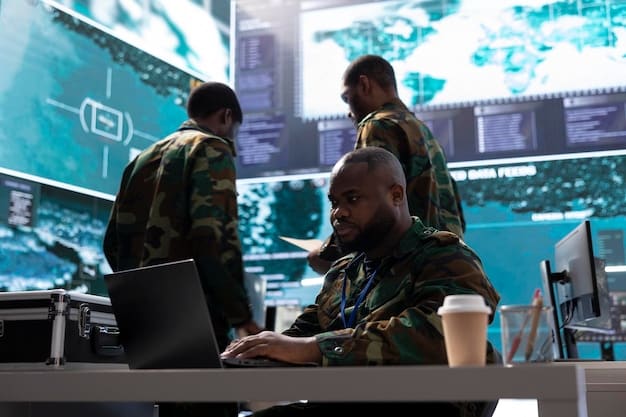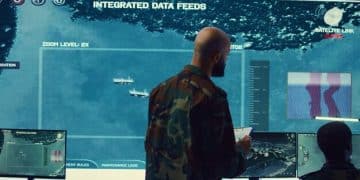How the US Military’s Hybrid Warfare Strategy Reshapes Conflict Resolution

The US Military’s emphasis on hybrid warfare significantly alters international conflict resolution strategies by blurring the lines between conventional and unconventional tactics, demanding more adaptive and comprehensive approaches to diplomacy and peace negotiations.
The modern battlefield is no longer confined to traditional military engagements. Instead, the rise of hybrid warfare—a blend of conventional warfare, irregular warfare, cyber warfare, and information operations—has transformed the landscape of international conflict. This shift in the US military’s strategic focus has profound implications for international conflict resolution strategies.
Understanding how does the US Military’s focus on hybrid warfare impact international conflict resolution strategies requires a comprehensive examination of its multifaceted dimensions and its effect on global stability.
Understanding Hybrid Warfare and Its Core Components
Hybrid warfare is a complex strategy that integrates various elements to achieve specific objectives. By understanding these core components, we can better grasp its impact on international conflict resolution.
Defining Hybrid Warfare
Hybrid warfare combines conventional military capabilities with unconventional methods, such as cyberattacks, disinformation campaigns, and support for proxy groups. Its multifaceted nature presents unique challenges for conflict resolution, as it blurs the lines between war and peace.
Key Elements of Hybrid Warfare
- Conventional Military Force: Traditional armed forces used in conjunction with other tactics.
- Irregular Warfare: Employing guerilla tactics, terrorism, and insurgency.
- Cyber Warfare: Disrupting critical infrastructure and spreading propaganda through digital means.
- Information Operations: Manipulating public opinion and undermining the adversary’s narrative.
Hybrid warfare’s complexity demands integrated conflict resolution strategies that adapt to the dynamic and multifaceted nature of modern threats.

The US Military’s Adaptation to Hybrid Warfare
The US Military has been actively adapting its strategies and capabilities to counter hybrid warfare threats. This adaptation includes organizational changes, technological advancements, and evolving doctrines.
Organizational and Structural Changes
The US military has restructured its forces to better address the challenges of hybrid warfare. This includes creating specialized units focused on cyber warfare, information operations, and unconventional warfare.
Technological Advancements
Investing in advanced technologies, such as artificial intelligence, cyber defense systems, and surveillance tools, is crucial for countering hybrid threats. These technologies enhance the US military’s ability to detect, deter, and respond to hybrid attacks.
Evolving Military Doctrines
The US military is updating its doctrines to incorporate hybrid warfare tactics and strategies. This involves developing new approaches to deterrence, defense, and conflict resolution that account for the complexity of hybrid threats. Furthermore, understanding how does the US Military’s focus on hybrid warfare impact international conflict resolution strategies necessitates a comprehensive examination of evolving military doctrines.
Impact on Traditional Conflict Resolution Strategies
The US Military’s focus on hybrid warfare has significant implications for traditional conflict resolution strategies, often requiring a more comprehensive and adaptive approach.
Limitations of Traditional Diplomacy
Traditional diplomatic methods are often insufficient in addressing hybrid warfare scenarios. The involvement of non-state actors, the use of disinformation, and the blurring of lines between war and peace complicate diplomatic negotiations. These limitations highlight the need for new approaches to conflict resolution.
Challenges in International Law
Hybrid warfare poses numerous challenges to international law. It is difficult to attribute attacks, define acts of aggression, and determine appropriate responses. This ambiguity undermines the effectiveness of international legal frameworks in resolving conflicts. The inherent difficulty in applying existing legal standards amplifies the complexities of this issue. The question of how does the US military’s focus on hybrid warfare impact international conflict resolution strategies is intricately linked to these very legal and ethical considerations.
The Need for New Conflict Resolution Frameworks
To effectively address hybrid warfare, new conflict resolution frameworks are needed. These frameworks should incorporate a broader range of tools, including cyber diplomacy, strategic communication, and targeted sanctions, as well as understanding how does the US Military’s focus on hybrid warfare impact international conflict resolution strategies.

The Role of Soft Power and Information Warfare
Soft power and information warfare play crucial roles in shaping the outcomes of hybrid conflicts and influencing international conflict resolution strategies.
Leveraging Soft Power
Soft power, which includes cultural influence, economic assistance, and diplomatic engagement, can be an effective tool in countering hybrid warfare. By promoting positive narratives and building alliances, soft power can help to undermine the adversary’s influence and foster stability.
Combating Disinformation Campaigns
Disinformation campaigns are a key component of hybrid warfare. Combating these campaigns requires a multi-faceted approach, including media literacy programs, fact-checking initiatives, and strategic communication efforts. The ability to effectively counter disinformation is critical for preventing escalation and promoting peaceful resolution.
Strategic Communication
Effective strategic communication is essential for shaping public opinion and influencing decision-makers. By clearly communicating its objectives and values, the US military can build support for its policies and counter the adversary’s propaganda. A well-crafted narrative can significantly alter the dynamics of a conflict.
The capacity to wield soft power adroitly and to counter disinformation effectively is pivotal in moderating the impact of hybrid warfare on international conflict resolution strategies.
Building International Partnerships and Alliances
International partnerships and alliances are critical for addressing the challenges of hybrid warfare and promoting effective conflict resolution.
Strengthening Alliances
Strong alliances provide a framework for cooperation and mutual support. By working together, allies can pool resources, share information, and coordinate strategies to counter hybrid threats. This collaborative approach enhances collective security and promotes stability.
Cooperation with Non-State Actors
Engaging with non-state actors, such as NGOs, civil society organizations, and academic institutions, can provide valuable insights and resources for conflict resolution. These actors can help to address the root causes of conflict, build trust, and promote reconciliation.
Information Sharing and Coordination
Effective information sharing and coordination are essential for detecting, deterring, and responding to hybrid threats. By sharing intelligence and coordinating operations, allies can enhance their situational awareness and improve their ability to counter hybrid attacks.
Building robust international partnerships and alliances helps to counter hybrid warfare’s challenges and supports effective conflict resolution on a global scale.
Future Trends and Challenges in Hybrid Warfare
As technology continues to evolve, hybrid warfare will likely become even more complex and challenging. Understanding future trends and challenges is essential for developing effective conflict resolution strategies.
The Increasing Role of Artificial Intelligence
Artificial intelligence (AI) is poised to play an increasingly significant role in hybrid warfare, both as a tool for attack and defense. AI can be used to automate disinformation campaigns, enhance cyberattacks, and improve situational awareness. However, it also raises ethical and strategic questions that must be addressed.
The Blurring Lines Between Peace and War
Hybrid warfare blurs the lines between peace and war, making it difficult to determine when a conflict has begun or ended. This ambiguity complicates conflict resolution efforts and increases the risk of miscalculation and escalation. Addressing this challenge requires a more nuanced understanding of conflict dynamics.
The Need for Adaptive Strategies
To effectively address hybrid warfare, adaptive strategies are needed. These strategies must be flexible, comprehensive, and capable of evolving in response to changing threats. They also must incorporate a wide range of tools, including diplomacy, economic sanctions, and military force. As future trends evolve, understanding how does the US Military’s focus on hybrid warfare impact international conflict resolution strategies will be crucial.
| Key Point | Brief Description |
|---|---|
| 🛡️ Hybrid Warfare | Blends conventional, irregular, cyber, and info tactics. |
| 🤝 Partnerships | Crucial for coordinated defense and conflict resolution. |
| 🌐 Soft Power | Leveraged to counter adversary influence and build stability. |
| 🤖 Artificial Intelligence | Growing role in hybrid warfare; raises strategic questions. |
Frequently Asked Questions
Hybrid warfare combines conventional military actions with unconventional tactics like cyber warfare, disinformation, and economic pressure, differentiating it from traditional warfare’s direct military confrontations.
Cyber warfare is a critical component, enabling the disruption of enemy infrastructure, theft of information, and spreading of propaganda. It’s a key tactic in modern hybrid conflicts.
Disinformation campaigns erode trust, polarize societies, and complicate diplomatic efforts, making conflict resolution more challenging. They can also enable how does the US Military’s focus on hybrid warfare impact international conflict resolution strategies.
Hybrid warfare raises ethical concerns due to its blurred lines between combatants and non-combatants, the use of covert operations, and the potential for civilian harm from cyberattacks and disinformation.
Sharing intelligence, coordinating cyber defenses, and aligning diplomatic strategies is essential. International cooperation enhances the ability to detect, deter, and respond to hybrid threats, showing how does the US Military’s focus on hybrid warfare impact international conflict resolution strategies.
Conclusion
In conclusion, the US Military’s emphasis on hybrid warfare has reshaped international conflict resolution by necessitating adaptive, comprehensive strategies. Addressing this complex challenge requires a blend of traditional diplomacy, technological advancements, and robust international partnerships.
Understanding how does the US Military’s focus on hybrid warfare impact international conflict resolution strategies is crucial for maintaining global stability and promoting lasting peace in an era defined by multifaceted threats.





